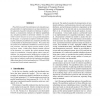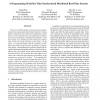171 search results - page 15 / 35 » Predicting the Performance of Synchronous Discrete Event Sim... |
JCST
2006
15 years 1 months ago
2006
This paper describes efficient data structures, namely the Indexed P-tree, Block P-tree, and Indexed-Block P-tree (or IP-tree, BP-tree, and IBP-tree, respectively, for short), for...
137
click to vote
WSC
1997
15 years 3 months ago
1997
Distributed discrete event simulation techniques aim at an acceleration of the execution of a self-contained simulation model by the spatial decomposition of that model and the co...
106
click to vote
ANSS
2000
IEEE
15 years 6 months ago
2000
IEEE
The abilityto predict the performance of a simulationapplicationbefore its implementationis an important factor to the adoption of parallel simulation technology in industry. Idea...
113
click to vote
RTAS
2007
IEEE
15 years 8 months ago
2007
IEEE
Discrete-event (DE) models are formal system specifications that have analyzable deterministic behaviors. Using a global, consistent notion of time, DE components communicate via...
103
click to vote
ICCAD
2001
IEEE
15 years 10 months ago
2001
IEEE
tems. STARS manipulates abstract representations of system components to obtain upper bounds on the number of various events in the system, as well as a bound on the response time....


